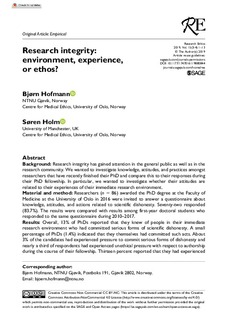Research integrity: environment, experience, or ethos?
Journal article, Peer reviewed
Published version
Permanent lenke
http://hdl.handle.net/11250/2640539Utgivelsesdato
2019Metadata
Vis full innførselSamlinger
Sammendrag
Background:
Research integrity has gained attention in the general public as well as in the research community. We wanted to investigate knowledge, attitudes, and practices amongst researchers that have recently finished their PhD and compare this to their responses during their PhD fellowship. In particular, we wanted to investigate whether their attitudes are related to their experiences of their immediate research environment.
Material and method:
Researchers (n = 86) awarded the PhD degree at the Faculty of Medicine at the University of Oslo in 2016 were invited to answer a questionnaire about knowledge, attitudes, and actions related to scientific dishonesty. Seventy-two responded (83.7%). The results were compared with results among first-year doctoral students who responded to the same questionnaire during 2010–2017.
Results:
Overall, 13% of PhDs reported that they knew of people in their immediate research environment who had committed serious forms of scientific dishonesty. A small percentage of PhDs (1.4%) indicated that they themselves had committed such acts. About 3% of the candidates had experienced pressure to commit serious forms of dishonesty and nearly a third of respondents had experienced unethical pressure with respect to authorship during the course of their fellowship. Thirteen percent reported that they had experienced unethical pressure in relation to other forms of dishonesty and 11% had experienced the consequences of some form of scientific dishonesty. Eighteen percent of the respondents believed that one or more actions, which in the literature were perceived as scientific misconduct, were not wrong. We find a connection between attitudes and the perceived research integrity of their research environment. The results also show a difference between PhD students and graduated PhDs in terms of scientific dishonesty. In some areas, the PhDs’ norms are stricter, such as for the use of statistical analysis methods, while there is little change in others, such as in misconduct in order to expedite publications.
Conclusion:
Many PhDs knew about serious forms of scientific misconduct from the research environment in which they are trained, and some also report misconduct themselves. Some experienced pressure to serious forms of misconduct and a large proportion of the respondents had experienced unethical pressure with respect to authorship during their fellowship. Attitudes change during the PhD studies, but ambiguously. Scientific misconduct seems to be an environmental issue as much as a matter of personal integrity.

